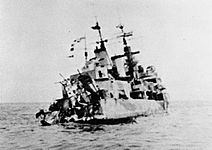Convoy QP 11 facts for kids
Quick facts for kids Convoy QP 11 naval battle |
|||||||
|---|---|---|---|---|---|---|---|
| Part of World War II | |||||||
 HMS Edinburgh showing the damage to its stern after the attack by U-456 |
|||||||
|
|||||||
| Belligerents | |||||||
| Commanders and leaders | |||||||
| Alfred Schulze-Hinrichs | |||||||
| Strength | |||||||
| 3 destroyers 2 U-boats |
1 cruiser 6 destroyers 4 minesweeper 1 guard-ship |
||||||
| Casualties and losses | |||||||
| 1 destroyer sunk | 1 cruiser sunk 3 destroyer damaged 1 Soviet freighter sunk |
||||||
Convoy QP 11 was a group of ships traveling together during World War II. This convoy was part of the Arctic Convoy missions. These missions involved merchant ships sailing from the Soviet Union back to Britain. They had just delivered important supplies to the Soviet Union.
Convoy QP 11 included 13 merchant ships and 18 warships that protected them. German destroyers and submarines attacked the convoy. During the battle, one merchant ship was lost. The light cruiser HMS Edinburgh was also sunk. The German forces lost one destroyer, the Z7 Hermann Schoemann.
Contents
Ships in Convoy QP 11
Convoy QP 11 had 13 merchant ships. Most of these ships were from Britain or America. Five of them had been part of an earlier convoy called Convoy PQ 13. The convoy started its journey from the Soviet port of Murmansk on April 28, 1942.
The warships protecting the convoy included the light cruiser HMS Edinburgh. Other escorts were the destroyers HMS Amazon, Beagle, Beverley, Bulldog, Foresight, and Forester. There were also four smaller warships called corvettes: Campanula, Oxlip, Saxifrage, and Snowflake. An armed trawler named Lord Middleton also helped. HMS Edinburgh was not just an escort. It was also carrying $20 million in gold. This gold was a payment from the Soviet Union to the United States.
The Convoy's Journey
On April 29, a German Ju 88 reconnaissance plane spotted the convoy. German U-boats (submarines) also saw it. Two days after leaving Murmansk, several U-boats attacked the convoy.
On April 30, U-88 and U-436 tried to attack but missed. Later that day, however, U-456 fired torpedoes at HMS Edinburgh. Two torpedoes hit the ship. One hit the front engine room. The other hit the back, damaging its steering and two of its four propellers. HMS Edinburgh was badly hurt but still floating. It left the convoy and headed back to Murmansk. The destroyers Foresight and Forester went with it.
Several ships were sent from Murmansk to help Edinburgh. These included British minesweepers Gossamer, Harrier, Hussar, and Niger. Two Soviet destroyers, Gremyashchy and Sokrushitelny, also came. A Soviet guard ship called Rubin and a tug joined them.
May 1st: German Attack
The German navy sent three destroyers to attack Convoy QP 11. These ships were Z7 Hermann Schoemann, Z24, and Z25. Their commander was Alfred Schulze-Hinrichs. Their mission was to attack the convoy and then sink HMS Edinburgh.
The German ships found the convoy on the afternoon of May 1. The weather was cold, with snow and rain that made it hard to see. Hermann Schoemann started firing at 2:05 PM. The four British destroyers quickly moved between the German ships and the convoy. They began fighting at a distance of about 10,000 yd (9,100 m). HMS Amazon was hit twice and badly damaged. At 2:30 PM, German torpedoes hit and sank the Soviet freighter Tsiolkovski. At 5:50 PM, the German destroyers left the convoy. They then turned to go after HMS Edinburgh.
May 2nd: The Final Battle
The German forces found HMS Edinburgh at 6:17 AM on May 2. It was about 250 nmi (460 km; 290 mi) east of the convoy. The cruiser was moving very slowly, at only two knots. Edinburgh was being protected by Foresight, Forester, the four British minesweepers, and Rubin. The Soviet destroyers Gremyaschi and Sokrushitelny had returned to Murmansk because they were low on fuel.
The three German destroyers attacked the British ships. Because of the damage from U-456, HMS Edinburgh could not steer properly. It could only move in circles. A snow shower separated Hermann Schoemann from the other German destroyers. So, it attacked the British ships alone. HMS Edinburgh's aiming systems were broken, but its gunners still managed to hit and cripple Hermann Schoemann.
At 6:45 PM, Z24 and Z25 arrived. Z25 hit and disabled Forester. It then badly damaged Foresight. At 6:52 PM, torpedoes from one of the German destroyers missed Foresight and Forester. One of these torpedoes kept going and hit HMS Edinburgh in the middle of its left side. This was right opposite the hole made by U-456's torpedo. Soon after, the German ships left. They might have thought the British minesweepers were stronger than they actually were.
At 8:15 AM, Z24 rescued most of the crew from Hermann Schoemann who were still on deck. Then, they sank their own damaged ship. More survivors from Hermann Schoemann who were in life rafts were later rescued by U-88. The minesweepers Harrier and Gossamer took survivors off HMS Edinburgh. The Edinburgh was later sunk by a torpedo from Foresight to prevent it from falling into enemy hands.
Aftermath
After these battles, the remaining ships of Convoy QP 11 continued their journey. The submarines U-589 and U-251 tried to attack the convoy but failed. The twelve merchant ships that were left arrived safely in Iceland on May 7.
Merchant Ships in Convoy QP 11

